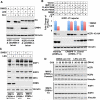The myeloma drug lenalidomide promotes the cereblon-dependent destruction of Ikaros proteins
- PMID: 24292623
- PMCID: PMC4070318
- DOI: 10.1126/science.1244917
The myeloma drug lenalidomide promotes the cereblon-dependent destruction of Ikaros proteins
Abstract
Thalidomide-like drugs such as lenalidomide are clinically important treatments for multiple myeloma and show promise for other B cell malignancies. The biochemical mechanisms underlying their antitumor activity are unknown. Thalidomide was recently shown to bind to, and inhibit, the cereblon ubiquitin ligase. Cereblon loss in zebrafish causes fin defects reminiscent of the limb defects seen in children exposed to thalidomide in utero. Here we show that lenalidomide-bound cereblon acquires the ability to target for proteasomal degradation two specific B cell transcription factors, Ikaros family zinc finger proteins 1 and 3 (IKZF1 and IKZF3). Analysis of myeloma cell lines revealed that loss of IKZF1 and IKZF3 is both necessary and sufficient for lenalidomide's therapeutic effect, suggesting that the antitumor and teratogenic activities of thalidomide-like drugs are dissociable.
Figures




Comment in
-
Haematological cancer: Ikaros--not a myth for myeloma.Nat Rev Clin Oncol. 2014 Feb;11(2):65. doi: 10.1038/nrclinonc.2013.237. Epub 2013 Dec 17. Nat Rev Clin Oncol. 2014. PMID: 24343667 No abstract available.
-
Medicine. How thalidomide works against cancer.Science. 2014 Jan 17;343(6168):256-7. doi: 10.1126/science.1249543. Science. 2014. PMID: 24436409 Free PMC article.
References
-
- Ito T, et al. Identification of a primary target of thalidomide teratogenicity. Science. 2010 Mar 12;327:1345. - PubMed
Publication types
MeSH terms
Substances
Grants and funding
LinkOut - more resources
Full Text Sources
Other Literature Sources
Medical
Molecular Biology Databases
Research Materials

